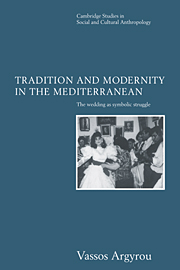Book contents
- Frontmatter
- Contents
- List of illustrations
- Acknowledgments
- Introduction
- 1 The island of Aphrodite
- 2 Nationalism and the poverty of imagination
- 3 The weddings of the 1930s
- 4 The meaning of change
- 5 Distinction and symbolic class struggle
- 6 Anthropology and the specter of “monoculture”
- 7 The dialectics of symbolic domination
- Appendix
- Notes
- References
- Index
- Cambridge Studies in Social and Cultural Anthropology
7 - The dialectics of symbolic domination
Published online by Cambridge University Press: 25 August 2009
- Frontmatter
- Contents
- List of illustrations
- Acknowledgments
- Introduction
- 1 The island of Aphrodite
- 2 Nationalism and the poverty of imagination
- 3 The weddings of the 1930s
- 4 The meaning of change
- 5 Distinction and symbolic class struggle
- 6 Anthropology and the specter of “monoculture”
- 7 The dialectics of symbolic domination
- Appendix
- Notes
- References
- Index
- Cambridge Studies in Social and Cultural Anthropology
Summary
In an influential article Michel Foucault (1982) depicts the goal of his work as an attempt to create a history of the different ways in which people become subjects. To begin with, people are turned into subjects through a process of objectification which is independent of them. For instance, they are objectified by the human sciences – the subject of labor becomes an object of study in economics – or by what Foucault calls “dividing practices,” such as the division between the mad and the sane. People, however, also turn themselves into subjects in another kind of objectification. They tie themselves to a particular identity whose full realization can be achieved only through the mediation, guidance, and ultimately submission to an outside authority – an authority who knows better. The idea is not new, but Foucault's use of it as a way of defining the predicament of people in Western societies merits attention. The emphasis on knowledge as power – the ability to define others or define how they define themselves – both recalls and anticipates the predicament of Others in relation to Western societies themselves.
My aim in this chapter is to explore some of the ways in which Cypriots have become Western subjects. The emphasis will be on division, but not as in the construction of the Other as a passive, mirror image of the West, which in any case has received sufficient attention.
- Type
- Chapter
- Information
- Tradition and Modernity in the MediterraneanThe Wedding as Symbolic Struggle, pp. 170 - 183Publisher: Cambridge University PressPrint publication year: 1996

